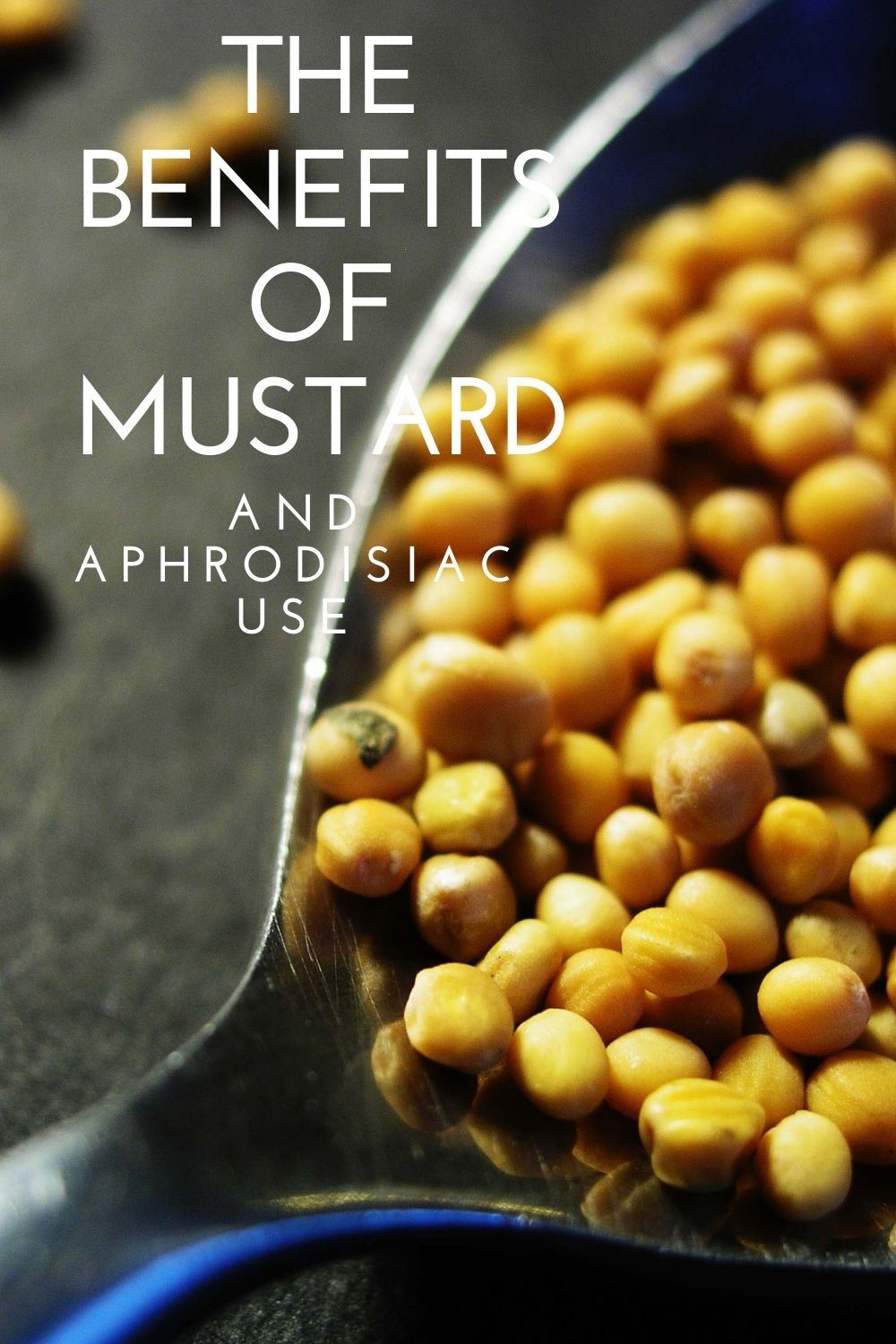
Mustard has a prominent history as an aphrodisiac in European culture. From the ancient Greeks to modern French, this condiment was believed to keep things spicy.
But there’s more to mustard benefits than a folkloric reputation for improving sexual vigor.
Yet it turns out, the lore and the actual medicinal benefits of mustard are linked. To better understand the appeal of mustard, I think it’s best to start from its earliest uses – which were more often than not as an aphrodisiac food.
What makes mustard an aphrodisiac?
The ancient Greeks were the first people that we know of to use mustard in medical applications.(Interestingly, mustard seeds were found in Egyptian tombs, indicating that the Egyptians enjoyed the pungent flavoring. And perhaps they also used the seeds in medicinal applications although we have no proof of the spice’s actual use in ancient Egyptian culture.)
But it was the Greeks who were the first to document the spice’s ability to increase circulation. And good circulation leads to good sex. That may be why this spice was regarded as a sexual aid throughout most of European history.
In fact, in the Middle Ages, monks were not permitted to ingest the yellow spice. It was believed to lead the men of God down the path to temptation.
The role of mustard in traditional Chinese medicine
And on the other side of the world in China, mustard seed was also embraced for medicinal purposes. But in the East, this intense spice was considered an aphrodisiac for its heat in the mouth and ability, when ingested in large enough doses, to warm the body as well.
Mustard aphrodisiac effects on the body
And as it turns out, the Chinese were really on the right track.
Mustard’s intense, spicy flavor can, according to The Stress-Eating Cure, cause a rise in adrenalin. And according to the research of Dr. Max Lake, the spice causes “maximal stimulation of the pain fraction of taste.” And it is this balance of pain and pleasure that brings eaters to a gastronomic climax.
RELATED: Peach-Mustard Glazed Pork Loin Recipe
What are mustard seeds vs prepared mustard?
You might be wondering if the mustard I’m referring to is the tiny, round seed of a mustard plant. Or, when I talk about the use of mustard in history, does that include the stuff we spread on bread, also called prepared mustard?
Mustard seeds aren’t frequently used in Western cooking, but the plants do grow in Europe and the United States. The seeds are more likely to appear in recipes from India and neighboring parts of Southeast Asia.
Prepared mustard, on the other hand, is one of the most popular condiments in the world. It is made by blending powdered mustard seeds with other ingredients, such as water, vinegar, wine, salt and other spices, to prepare a smooth, pungent yellow paste.
TO TRY: The BEST Black Truffle Mustard
According to Wikipedia, this condiment dates back to ancient Rome. And it was likely mustard the condiment that was regarded as an aphrodisiac throughout much of European history. This is not surprising since even in this dilution of other, more palatable ingredients, mustard offers many benefits to sexual health and overall health.
Have you ever made chicken salad with a touch of Dijon? Don’t miss this recipe!
Mustard benefits to health
The notable attributes of mustard seed and prepared mustard that made this ingredient historically aphrodisiac, including pungency and heat, is only part of the story when it comes to the health benefits of mustard.
This potent spice is nutrient-rich. More importantly, it is rich with nutrients beneficial to sexual health. And it is a source of several nutrients particularly beneficial to men’s libido and sexual performance.
Why mustard is good for males
Mustard seed is a source of selenium, magnesium and omega-3 fatty acids, all essential for maintaining sexual health.
It is also a source of manganese, zinc and dietary fiber, which are also considered essential to sexual health for both men and women. However, nutrients like manganese and zinc are deemed extremely important to men when it comes to maintaining their performance in the bedroom.
The mustard testosterone link
According to Nursing Times, a 2011 study researched a possible link between mustard and testosterone. Lab research, (first on rat cells than on live rats), investigated whether a plant-derived steroid, 28-homobrassinolide [HB], found in mustard could stimulate protein synthesis similarly to anabolic steroids, which mimic the activity of male hormones, including testosterone. (But without the negative side effects.)
The conclusion was that this plant-derived steroid appeared to increase lean body mass and strength. However, HB only caused minimal increase in testosterone activity. Since the use of HB was equally effective on castrated rats, the natural conclusion is that this plant steroid works in a very different way than anabolic steroids.
So if you’re looking to increase muscle mass, mustard may be your fuel. But if you just need testosterone, you better look to ingredients recognized for increasing testosterone production, like oats.
Discover more of the world’s greatest aphrodisiac foods
This article was written in 2010 and most recently updated in July 2021.
- Should You Use Moringa Powder for Sex? A Moringa Powder Review - April 11, 2024
- Carrot Juice Bloody Mary Mix: a sweet & sexy twist on a classic - March 21, 2024
- Authentic Japanese Shrimp Tempura Recipe - March 18, 2024
Did you know that eating the right foods can be the key to boost your sex life?
And we're going to help you start right now. Subscribe to Amy Reiley's private mailing list for weekly tips, recipes and honest advice. As a bonus, you'll get her exclusive list of Six Great Sex-Boosting Snack Foods for FREE!



Leave a Reply
Want to join the discussion?Feel free to contribute!